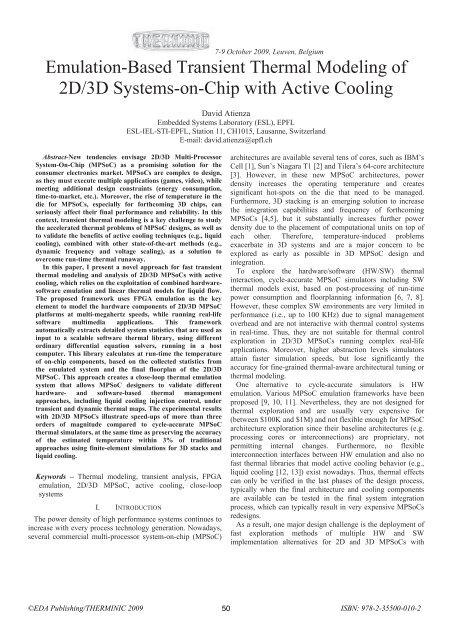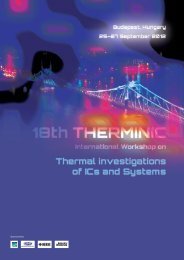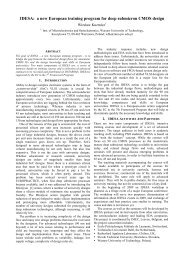Online proceedings - EDA Publishing Association
Online proceedings - EDA Publishing Association
Online proceedings - EDA Publishing Association
You also want an ePaper? Increase the reach of your titles
YUMPU automatically turns print PDFs into web optimized ePapers that Google loves.
7-9 October 2009, Leuven, Belgium<br />
Emulation-Based Transient Thermal Modeling of<br />
2D/3D Systems-on-Chip with Active Cooling<br />
David Atienza<br />
Embedded Systems Laboratory (ESL), EPFL<br />
ESL-IEL-STI-EPFL, Station 11, CH1015, Lausanne, Switzerland<br />
E-mail: david.atienza@epfl.ch<br />
Abstract-New tendencies envisage 2D/3D Multi-Processor<br />
System-On-Chip (MPSoC) as a promising solution for the<br />
consumer electronics market. MPSoCs are complex to design,<br />
as they must execute multiple applications (games, video), while<br />
meeting additional design constraints (energy consumption,<br />
time-to-market, etc.). Moreover, the rise of temperature in the<br />
die for MPSoCs, especially for forthcoming 3D chips, can<br />
seriously affect their final performance and reliability. In this<br />
context, transient thermal modeling is a key challenge to study<br />
the accelerated thermal problems of MPSoC designs, as well as<br />
to validate the benefits of active cooling techniques (e.g., liquid<br />
cooling), combined with other state-of-the-art methods (e.g.,<br />
dynamic frequency and voltage scaling), as a solution to<br />
overcome run-time thermal runaway.<br />
In this paper, I present a novel approach for fast transient<br />
thermal modeling and analysis of 2D/3D MPSoCs with active<br />
cooling, which relies on the exploitation of combined hardwaresoftware<br />
emulation and linear thermal models for liquid flow.<br />
The proposed framework uses FPGA emulation as the key<br />
element to model the hardware components of 2D/3D MPSoC<br />
platforms at multi-megahertz speeds, while running real-life<br />
software multimedia applications. This framework<br />
automatically extracts detailed system statistics that are used as<br />
input to a scalable software thermal library, using different<br />
ordinary differential equation solvers, running in a host<br />
computer. This library calculates at run-time the temperature<br />
of on-chip components, based on the collected statistics from<br />
the emulated system and the final floorplan of the 2D/3D<br />
MPSoC. This approach creates a close-loop thermal emulation<br />
system that allows MPSoC designers to validate different<br />
hardware- and software-based thermal management<br />
approaches, including liquid cooling injection control, under<br />
transient and dynamic thermal maps. The experimental results<br />
with 2D/3D MPSoCs illustrate speed-ups of more than three<br />
orders of magnitude compared to cycle-accurate MPSoC<br />
thermal simulators, at the same time as preserving the accuracy<br />
of the estimated temperature within 3% of traditional<br />
approaches using finite-element simulations for 3D stacks and<br />
liquid cooling.<br />
Keywords – Thermal modeling, transient analysis, FPGA<br />
emulation, 2D/3D MPSoC, active cooling, close-loop<br />
systems<br />
I. INTRODUCTION<br />
The power density of high performance systems continues to<br />
increase with every process technology generation. Nowadays,<br />
several commercial multi-processor system-on-chip (MPSoC)<br />
architectures are available several tens of cores, such as IBM’s<br />
Cell [1], Sun’s Niagara T1 [2] and Tilera’s 64-core architecture<br />
[3]. However, in these new MPSoC architectures, power<br />
density increases the operating temperature and creates<br />
significant hot-spots on the die that need to be managed.<br />
Furthermore, 3D stacking is an emerging solution to increase<br />
the integration capabilities and frequency of forthcoming<br />
MPSoCs [4,5], but it substantially increases further power<br />
density due to the placement of computational units on top of<br />
each other. Therefore, temperature-induced problems<br />
exacerbate in 3D systems and are a major concern to be<br />
explored as early as possible in 3D MPSoC design and<br />
integration.<br />
To explore the hardware/software (HW/SW) thermal<br />
interaction, cycle-accurate MPSoC simulators including SW<br />
thermal models exist, based on post-processing of run-time<br />
power consumption and floorplanning information [6, 7, 8].<br />
However, these complex SW environments are very limited in<br />
performance (i.e., up to 100 KHz) due to signal management<br />
overhead and are not interactive with thermal control systems<br />
in real-time. Thus, they are not suitable for thermal control<br />
exploration in 2D/3D MPSoCs running complex real-life<br />
applications. Moreover, higher abstraction levels simulators<br />
attain faster simulation speeds, but lose significantly the<br />
accuracy for fine-grained thermal-aware architectural tuning or<br />
thermal modeling.<br />
One alternative to cycle-accurate simulators is HW<br />
emulation. Various MPSoC emulation frameworks have been<br />
proposed [9, 10, 11]. Nevertheless, they are not designed for<br />
thermal exploration and are usually very expensive for<br />
(between $100K and $1M) and not flexible enough for MPSoC<br />
architecture exploration since their baseline architectures (e.g.<br />
processing cores or interconnections) are proprietary, not<br />
permitting internal changes. Furthermore, no flexible<br />
interconnection interfaces between HW emulation and also no<br />
fast thermal libraries that model active cooling behavior (e.g.,<br />
liquid cooling [12, 13]) exist nowadays. Thus, thermal effects<br />
can only be verified in the last phases of the design process,<br />
typically when the final architecture and cooling components<br />
are available can be tested in the final system integration<br />
process, which can typically result in very expensive MPSoCs<br />
redesigns.<br />
As a result, one major design challenge is the deployment of<br />
fast exploration methods of multiple HW and SW<br />
implementation alternatives for 2D and 3D MPSoCs with<br />
©<strong>EDA</strong> <strong>Publishing</strong>/THERMINIC 2009 50<br />
ISBN: 978-2-35500-010-2







